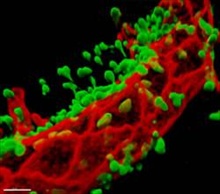Channels
Special Offers & Promotions
Bitplane Imaris 4D Software helps the Centre for Microvascular Research understand regulation of transendothelial migration of neutrophils in vivo
 The migration of neutrophils from the vascular lumen
into inflamed tissues is a crucial component of the normal immune response and
a significant factor in the development of inflammatory pathologies, where
inappropriate inflammation contributes to tissue damage and disease
progression. A decisive step in this process is the passage of the blood
neutrophils through the endothelial cells lining the lumen - transendothelial
migration (TEM).
The migration of neutrophils from the vascular lumen
into inflamed tissues is a crucial component of the normal immune response and
a significant factor in the development of inflammatory pathologies, where
inappropriate inflammation contributes to tissue damage and disease
progression. A decisive step in this process is the passage of the blood
neutrophils through the endothelial cells lining the lumen - transendothelial
migration (TEM).The complex structure of the vessel wall and the contribution of environmental factors, such as blood flow and local chemokine production, have limited the value of in vitro studies into the mechanisms governing this process. Now, advanced Imaris 4D modelling software from Bitplane is enabling in vivo analysis of the dynamics of leukocyte migration with a high degree of spatial and temporal resolution, leading to a new understanding of TEM regulation highlighting the role of junctional adhesion molecule C (JAM-C).
The work is reported in a paper by Dr Abigail Woodfin and her colleagues at the Centre for Microvascular Research, which investigates the molecular and cellular events within the microvasculature focusing on the regulation of vascular integrity, morphology and function. The Centre has a strong and internationally acknowledged expertise in the application of specialised imaging methods, including confocal intravital microscopy which allows in vivo observation of events within the microcirculation, in 3D, in real time.
"After investigating several 3D modelling platforms we chose Bitplane Imaris. As well as a comprehensive feature set and user-friendly interface, it proved to be the most stable when analysing very large files, which was essential to our work," says Dr Woodfin. "Because of this, Imaris enabled us to track the movement of leukocytes relative to the endothelial cells lining the vessel wall over many sequential time points.
"During long periods of analysis there is always a degree of movement with living tissue and we used the Imaris drift correction function to correct for this. The crucial thing was that Imaris allowed us to convert our data into a virtual 3D object that could be fully manipulated in terms of rotation position, zoom, and the intensity at which each channel is displayed. This is not possible using 2D projections of Z-stacks, which is how confocal microscopy images are traditionally presented."
"Fast, precise and easy-to-use, Imaris is a uniquely powerful and versatile solution for the visualization, analysis and interpretation of 3-D and 4-D images," says Marcin Barszczewski at Bitplane. For additional flexibility, Imaris also offers a range of eleven specialist modules, including MeasurementPro, Track, Coloc and FilamentTracer."
To learn more about scientific image analysis and characterization using Imaris software, and access our comprehensive applications area, please visit the Bitplane website (www.bitplane.com).
Reference
Abigail Woodfin, Mathieu-Benoit Voisin, Martina Beyrau, Bartomeu Colom, Dorothée Caille, Frantzeska-Maria Diapouli, Gerard B Nash, Triantafyllos Chavakis, Steven M Albelda, G Ed Rainger, Paolo Meda, Beat A Imhof & Sussan Nourshargh "The junctional adhesion molecule JAM-C regulates polarized transendothelial migration of neutrophils in vivo," Nature Immunology 12(8), 761-769 (2011)
This research was funded by the Wellcome Trust
About Bitplane
Bitplane, the world's leading Interactive Microscopy Image analysis software company, was founded in 1992 and operates out of two offices: one in Zurich, Switzerland, and one in Saint Paul, MN, USA. Customers in all parts of the world are served with direct representation in the US, Canada, China and Europe and through partner organizations in Asia and Australia. Through constant innovation and a clear focus on 3D & 4D imaging, Bitplane actively shapes the way scientists process microscopic images. More information may be found at the Bitplane website (www.bitplane.com).
Bitplane was acquired by Andor Technology plc. in 2009. Andor is a world leader in Scientific Imaging, Spectroscopy Solutions and Microscopy Systems, employing over 260 people in 16 offices worldwide, distributing its portfolio of over 70 products to 10,000 customers in 55 countries. Andor's vast product portfolio and experience brings the capacity and system knowledge to further expand the technological developments from Bitplane. More information about Andor Technology PLC (LSE: AND) is available at the company's website (www.andor.com).
Media Partners


